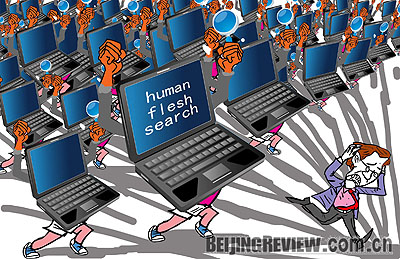|

Being too critical, outspoken or engaging in behavior deemed immoral can get you into big trouble in China. And it's not the authorities we're talking about here. The power of the people has found a new outlet to vent in recent times. It's called renrou sousuo, or "human flesh search engine."
It's not a search engine in the conventional sense, but relies on the collective skills of those who frequent forums and chat rooms to dig up personal information of their target and then expose this to the media at large in well-publicized name-and-shame campaigns. It's a form of cyber kangaroo court with national consequences and has been used effectively in recent times from incidents as diverse as tracking down a girl who was critical of the Sichuan earthquake, to uncovering the identity of a woman who killed a kitten with her high-heel shoe and posted a video of her actions online.
"In the past, this engine is used for the sake of justice, but now most of the users are just letting off steam," a moderator at Mop website (dzh.mop.com) told Beijing-based International Herald Leader. Mop is the first interactive online community to offer human flesh search service.
By the end of June, China's Internet users had reached 253 million, replacing the United States as the largest in the world. The popularity of Internet encourages the use of the human flesh search engine.
At the same time, the debate about whether this virtual lynching is acceptable continues to grow.
A survey by China Youth Daily shows that of the 2,491 being surveyed, 79.9 percent believe this method of revealing the identity of people should be controlled and standardized, 65.5 percent say this concept might be used by some people to let off steam about those they don't like or even as a tool for revenge, 64.6 percent believe it is violating people's privacy and 20.1 percent are afraid that they might become the next searched target. Zhu Zhigang, a lawmaker at the Standing Committee of the National People's Congress, China's top legislature, proposed that it's time to bring people involved in these searches to justice as they are criminally liable, having seriously affected citizens' basic right to privacy.
Laws needed to stop intrusions
Li Kejie (Procuratorial Daily): Criminal liability is the toughest penalty for lawbreakers and the Criminal Law is the strongest weapon to safeguard citizens' legitimate rights.
However, if there are no corresponding criminal clauses on human flesh search engine-related cases, it means that searchers are not criminally liable and this reflects the loopholes in China's legal system on citizens' privacy.
The human flesh search engine, which is increasingly becoming a kind of Internet violence, will leak not only citizens' names, addresses and telephone numbers, but also other important information. This is a violation of target people's basic rights and interests. Meanwhile, victims are almost unable to control the spread of information or to locate the pursuer.
To curb such behavior, the Civil Law alone is not enough, especially when these searches lead to people's suicide or acts of revenge. Here, searchers are criminally liable.
Dang Zi (www.tianshannet.com.cn): Generally speaking, the human flesh search engine is used for two purposes. The first is to find missing people. Even if it is used for this purpose, if it is not requested by those close to the missing person, this action is also likely to harm those involved. Finding someone without getting permission from family or friends shows lack of respect. Another role the human flesh search engine plays is to track down wanted criminals sanctioned by the authorities. Those who use human flesh search for this purpose do so in the name of justice. It sometimes also happens that this engine is used as a tool for revenge.
In some sense, the human flesh search engine is a product of the combination of modern information technology and some bad traditional customs in the Chinese society, such as the lack of legal awareness and lack of tolerance. Therefore, to formulate special laws to deal with actions that violate citizens' privacy is a kind of much-needed social progress.
Yang Gengshen (Modern Express): Actually, the human flesh search engine is nothing but a tool for people to pry into the privacy of others in the name of maintaining morality and justice. While doing so, they hide their true names and identity. After this engine became popular, except for a very small number of cases, almost all the searched targets were criticized as immoral. However, is it proper to deal with immorality and injustice with the same immoral and unjust method?
| 